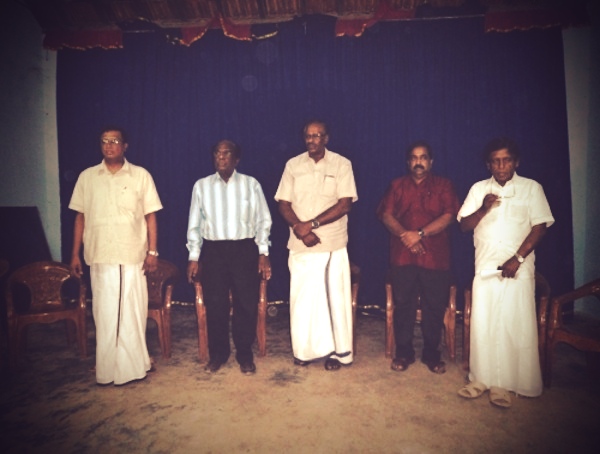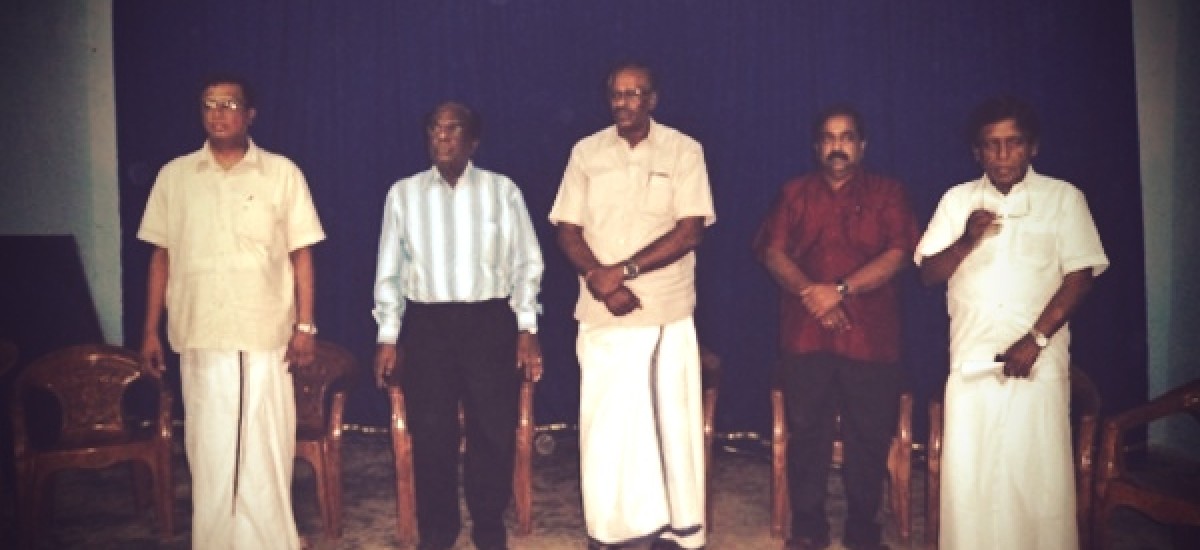
TNA MPs at the assault location. Photo courtesy Transcurrents
A comment left on Groundviews left recently by a well-known commentator David Blacker, notes,
“When you attempt to use terrorism to further your goals, it is then silly to whine about the other side giving you a taste of your own medicine. Every step of the way from 2001, the Tamils have no one to blame for their plight but the Tigers and those who financed and supported them. From breaking the CFA, walking out of talks, boycotting the presidential elections, chasing out the SLMM, and aggressively pushing for a military solution, the Tigers opened Pandora’s box. The legacy of this is that there will not be Eelam or even justice for the SL Tamils ever.“
Emphasis ours. Arguably, if there is to be no Eelam, then the people of Jaffna have to be presented with a range of democratic alternatives and enjoy an environment conducive for representatives of all political parties to contest ideas as well as elections. If there is to be a modicum of justice, voters in these areas need to be allowed to exercise their franchise, which in the past was denied by the LTTE in particular. This is clearly not happening. The recent attack on TNA MPs by the Sri Lankan Army occurs in a context of relative peace, not war. Condemning the brutal attack, the Island newspaper noted (and readers in Sri Lanka will recognise that this was emphatically not newspaper that was opposed to the war),
“Thursday’s savage attack on a group of Tamil National Alliance (TNA) parliamentarians at a meeting in Jaffna must be condemned unreservedly. Among the injured are TNA members and the police officers providing security to MPs. The TNA has identified the assailants as military personnel… The people of the North, who went through hell under Prabhakaran’s jackboot, must not be made to suffer under anyone else’s. Thursday’s cowardly act of terrorism perpetrated against a group of parliamentarians and civilians engaged in democratic activity is also a body blow for the on-going reconciliation process.
Unless the government and the Army Commander act immediately to have Thursday’s dastardly attack probed and the suspects dealt with according to the law, they will only help a different breed of terrorism emerge in the former war zone, where people are struggling to rebuild their lives. They will also prove right their critics who accuse them of sweeping the so-called accountability issues under the carpet.
At the time, Dr. Sumanasiri Liyanage, a well-known political commentator, warned that ‘investigations’ into this incident – despite assurances from the ever-helpful Rajapaksa fraternity, the Army and the Police – would not amount to anything. Dr. Liyanage averred,
“It is also interesting to note that this dastardly act was executed while the government was having talks with the TNA over the Tamil national question and just after high-powered Indian delegation left the island following talks with the President over, inter alia, the issue of devolution of power. Although Secretary of Defence, Jaffna Army Commander and the police have promised time and again that “the matter will be investigated and the miscreants severely punished” irrespective of their political affiliations or positions, people are yet to be informed of the outcome of the promised investigation. When we reflect on similar attacks on media personnel, the Opposition and trade unionists in the south during the last two years, one can easily guess that such investigations would not reveal anything and the perpetrators would be allowed to go scot free.”
And scot free they have in fact gone. Not just that, the President has the chutzpah to now claim there was not in fact an attack on the TNA, even before the ‘investigations’ into the incident were complete! Good luck with any final report, if one ever sees the light of day, that dares to disagree with the President.
The responses to the attack are revealing.
See a larger version of this timeline here.
One is hard pressed to find a response from the Army that doesn’t reveal an undercurrent of intolerance and suspicion. Jaffna’s Brigade Commander, Major General Mahinda Hathurusinghe, speaking two days after the attack notes,
“They (army personnel) had assaulted people who had assembled there and chased them away and also caused damage to bicycles and motor cycles etc. We strongly condemn the interference of the army with the fundamental rights of the civilians. Freedom of assembly, speech and movement are inherent rights of the people”
But in the same statement he notes,
“I must talk the truth — the TNA is also waiting for an opportunity to shout for help at the drop of a hat.”
It’s almost as if he believe the TNA orchestrated an Army attack upon itself for electoral gain. Equally if not far more bizarre is the disconnect between what Maj. Gen. Hathurusinghe notes above and what he noted a day later as reported in the Sunday Times,
“It is unlikely that the Army was involved in the incident…”
It gets more farcical. The Army run Civil Military Coordination for Jaffna (CIMIC) website, in an entry about the attack says,
“In the wake of an incident where a group of people attired similar to military uniforms had an argument with MSD Police personnel attached to Jaffna TNA Parliamentarians and disturbed their meeting at Alveddi recently, a special discussion was held between the Commander Security Forces – Jaffna (SF-J) Major General Mahinda Hathurusinghe and four senior TNA Parliamentarians Saturday (18) at Civil Affairs and Public Relations Office Jaffna.”
Emphasis ours. This sounds awfully like government denials of those featured in Sri Lanka’s Killing Fields, produced by Channel 4 (“they wear fatigues similar to soldiers, but they really aren’t soldiers”). Contradicting Maj. Gen. Hathurusinghe, CIMIC can’t even bring itself to say the Army was involved. In openly saying there are random groups of individuals, who in Army fatigues and armed wantonly go around attacking parliamentarians in the Peninsula is a page out of Pinter or Beckett’s finest, albeit with more far more serious implications for any meaningful democracy in a region under the control of the Army.
Note also how the attack is referred to as a ‘disturbance’. Yet as TNA Parliamentarian M. A. Sumanthiran expressed quite clearly, this was no mere ‘disturbance’,
“…if not for the personnel of the Ministerial Security Division (MSD) shielding the five TNA Parliamentarians by surrounding them and taking the brunt of the attack, which resulted in the MSD officers having to seek treatment at Tellippalai Hospital, the TNA MPs, too, would have been injured badly…”
‘Incident’, ‘clash’, ‘disturbance’ are the most commonly used phrases to describe the attack. When ‘attack’ is used, it is prefaced by ‘alleged’ – never mind the MSD personnel in hospital or the injuries sustained by many others. It gets worse. Instead of actually investigating the incident, it appears that the cover up began almost immediately after the attack ended. As D.B.S. Jeyaraj notes,
“In an ironic twist these policemen have fallen foul of defence superiors for discharging their duties efficiently & protecting the Tamil MP’s. When the military mob invaded the hall the Policemen were asked not to interfere & keep quiet but the cops refused & defended the TNA leaders. Efforts are on to blame the incident on the Police bodyguards.There is a move to depict the incident as being due to army-police friction. “Disciplinary” action is likely to be taken against the brave police personnel after the inquiries into the incident are over in due course. Incidently the bodyguard who fired back at gunmen who targeted TNA Jaffna district MP Sivagnanam Sreetharan is about to retire from service. Instead of being commended for his bravery the courageous cop had been harassed severely & forced to quit the Police & seek retirement.”
Even before this attack, the severe deterioration of law and order in Jaffna was the subject of a Parliamentary debate earlier this year. Much like in the Parliamentary debates on the 18th Amendment, where submissions by the TNA were the best on the topic, the response by Government benches to the serious threats to human security in post-war Jaffna were racist jibes and loud, frequent interruptions.
But it’s not just the TNA that flags with concern the continuing militarisation of the Peninsula. In an interview published on Groundviews, Dr. Muttukrishna Sarvananthan, who heads the Point Pedro Institute based in Jaffna notes,
To the best of my knowledge not much is being done towards demilitarisation in the Northern Province, except drastic cuts in the security check points in the Jaffna peninsula and scaling-down of high security zones in certain areas. I do not think there has been any reduction or increase in the number of armed forces personnel stationed in the North. There are few instances where withdrawal of armed forces personnel has been filled by pro-government militia/s. I do not foresee demilitarisation to any significant extent until the Rajapakshas are in power. Militarisation is indispensable for the perpetuation of the Rajapaksha dynasty.
In the same interview, he goes on to say,
“Unfortunately, the Rajapaksha regime has failed to capitalise on the resentment of the Tamil civilians towards the LTTE. The priority of the Rajapakshas was consolidation of political power rather than winning the broken hearts and minds of northern Tamils. Rajapakshas were more interested in pampering to the parochial euphoria of the majority community (playing to the gallery) rather than bonding a fractured nation.”
The Indian Prime Minister Dr. Manmohan Singh recently reiterated that the grievances of the Tamil community in Sri Lanka were legitimate, that Tamils feel they are reduced to second-class citizens and that Sinhala chauvinism is a reality. Tellingly, not even English mainstream print media gave full or accurate coverage to this statement.
The bizarre responses to what was a brutal attack, post-war, in broad daylight, against unarmed Parliamentarians engaging in nothing more subversive than the democratic process and it’s subsequent denial by the President himself – essentially shutting the door on any investigation or punitive measures – reflects a desire by government to, unilaterally and violently if necessary, define Tamil politics and moreover, throttle the growth of a more plural Tamil polity and society. These attacks are justified by senior government ministers, who believe that “the UPFA and other political parties represented more Tamils than the TNA”, which means that more can be expected in the future.
The resulting humiliation of the TNA MPs is keenly felt and watched by a larger Tamil community, domestic as well as international. The domestic community is voiceless, caught in a bind and largely powerless. The diaspora is not, and condoning this kind of senseless violence strengthens over time the very forces the government has decimated within the country.
It’s not just Tamils in Sri Lanka who should be very worried.
###
Update, 5 July 2011, 9.14pm: We’ve just watched in full the BBC Hardtalk interview with senior government minister and Presidential Advisor Rajiva Wijesinha, available on YouTube here. Wijesinha’s comments over the Army’s attack on the TNA meeting in Jaffna come around 20 minutes and 42 seconds into the video. Click here for precise moment.
Sackur: “With respect, I am sure you know much better than I do, the Tamil National Alliance had its meeting broken up by the Army in the last few weeks and they are only actually fighting local, town council elections”
Wijesinha: “No, you’re perfectly right. There was a meeting. I’ve asked them information about that. We discussed that with the Tamil National Alliance. As I told them, they benefitted so much from it – but I’m sure it wasn’t them – but they were really quite happy about it.”
Outrageous stuff.

